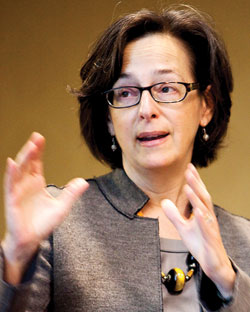Future Law: Rethink Client Needs, or Else

Carole Silver: “Lawyers need teamwork.” Photo Marc Mauldin
Law practice is changing so fast and so dramatically that wholesale groups of lawyers either need to change how they operate or face finding another line of business.
That’s according to an American Bar Foundation-sponsored panel that gathered to discuss “The Future of Lawyering” at the midyear meeting in Atlanta.
“A tidal wave is hitting the legal profession,” said Richard Peña, immediate-past president of the foundation, who moderated the panel before a packed room. “The question is: Are we ready?”
The answer, according to the four-member panel, is no.
Technology and globalization have caused a massive shift in how potential clients get legal information. Lawyers and law schools are not keeping up.
“If you think nostalgically about the practice of law and how it used to be, then you are on the train tracks and not on the train,” said Frederic Ury, president-elect of the National Conference of Bar Presidents and former Connecticut Bar Association president. “The development of artificial intelligence along with increased Internet search capabilities is making access to answers for complex legal questions easier and cheaper.”
Ury pointed to Web-based legal information and document sites such as LegalZoom, CyberSettle, CompleteCase.com and Google Scholar, which are providing basic legal information that lawyers once provided for a fee.
“Why is someone going to pay $700 to have a lawyer prepare a will when they can get it for $49 online?” Ury said. “We have had a monopoly on answering legal questions about the law. But the consumer—our former clients—can now get that information for free on Google.”
CALLING ON LAW SCHOOLS
“Virtual law firms are here,” Ury said, “and there are now thousands of small-town and small-firm lawyers who once depended on those consumers who may not make it.”
But Ury and the other panelists said there is a solution: Lawyers must provide services that are “value-adds” to their clients. The value-add, they said, is knowing your client’s business better and helping them solve problems that they couldn’t figure out.
William Henderson, director of the Center on the Global Legal Profession at Indiana University, said law schools need to adjust their curriculum to equip students with better communication and collaboration skills.
“Law schools need to rethink legal education to encourage lawyers to work together as a team, especially in the global marketplace,” agreed fellow Indiana University law professor Carole Silver, who is also an ABF affiliated scholar. Silver said international law students come to U.S. law schools with relationship-building as a key priority.
“U.S. law schools need to focus on relationships,” Silver said. “We need to teach lawyers how to do a better job of playing in the sandbox.”



